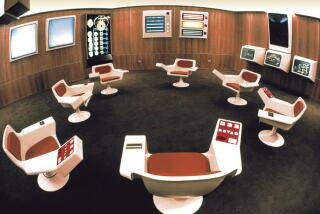Cuban Guerrillas Scale the Cyber Walls
- Share via
HAVANA — A nerdy new rebel has emerged in Cuba: the Internet guerrilla.
His laptop case has replaced the beret as the signature of revolution among thousands of mostly young male professionals, who through subversive cunning have become nearly as wired as anyone in the world despite Cuban law prohibiting unauthorized private Internet use.
Known among themselves as informaticos, they represent resistance to a government that has sought to stifle the flow of information since the revolution four decades ago. Encouraged by tentative government steps to wire the country, the growing number of Cubans who ignore official prohibitions to look at foreign news pages, listen to pirate music sites and browse computer training courses online are speeding along Cuba’s rugged road to the Information Age.
“I’m a member of the generation born just after the revolution,” said a 31-year-old engineer, who, like other illegal Internet users, agreed to speak only on condition of anonymity. “We all saw the giant Soviet mainframe computers linked together that did so little. The PC and Internet are new, independent ways of thinking. To us, Bill Gates and Linus Torvalds are gurus.”
After watching the flow of information help fuel the Soviet Union’s disintegration, the Cuban government has clamped down on Internet technology even as the number of users throughout the rest of Latin America doubles each year. Controlling what Cubans read and hear has been part of President Fidel Castro’s rule from the beginning. In theory, Cubans have access only to state-run newspapers and government television and radio, but many listen regularly to foreign news broadcasts.
That the Internet poses a serious threat to the information monopoly has not eluded the leadership: Cuba has one of the lowest per capita rates of computer and telephone ownership in the hemisphere. Only a select few Cubans, mostly those with access to U.S. dollars, can afford a computer even with the deep discounts that come with government approval. Buying them on the black market is illegal. But, according to computer enthusiasts and dissidents, thousands of young Cubans do so, and the practice is well known.
Internet connections are prohibited without government permission. Only about 40,000 officials, businesses and foreigners in a country of 11 million people have been authorized to link up, the government estimates. But thousands more have found a way to plug into the official links without permission.
The government is just beginning to test the waters of the Information Age after years of blaming the U.S. trade embargo for depriving Cuba of the resources to prepare for it. Cuba plans to spend $100 million annually to bring in digital phone lines, wireless technology and other advances that could expand Internet availability.
Across the capital, signs of a “dot-com” world are sprouting. Computer courses offered at youth clubs are jammed with students ranging in age from 4 to 40. A new breed of Internet entrepreneur has arrived, helping the government create Web pages mostly designed to lure tourists. And streets are being torn up to install digital phone lines and cable.
“Without the U.S. blockade, we’d already have the resources to put the Internet in homes, offices, everywhere,” said Francisco Miranda, who runs a rubber factory and receives government-approved discounts on computer equipment that bring prices down 75%.
Whether a liberalization of government Internet policy will accompany the new investment remains to be seen. Cuban dissidents say they believe that the prohibition on home Internet connections will remain and that any Internet access in public places, such as a string of cyber cafes the government plans, will be monitored and cost too much for most Cubans.
“Castro wants to keep Cuba like a medieval fortress surrounded by a moat,” said Elizardo Sanchez, a leading dissident. “For us, we would be jailed for using it, although I don’t know whether anyone has been so far. We have to have friends in the government who will allow us to use theirs to get any access at all.”
Others essentially steal it, using authorized passwords assigned to the businesses where they work to log on to the Internet at home.
Inside the tin door of a crumbling building on the edge of Old Havana, a bare light bulb illuminates two chairs, a rusting refrigerator and a globe next to a partition of glass and wood. The partition hides a computer, cobbled together with parts bought on the thriving black market. A high-pitched whistle and crackle rise above the street noise, and a Yahoo Spanish-language home page pops onto the screen. The computer’s 26-year-old owner types the Web address for CNN’s Spanish-language Web site, scans the headlines, then enters a site called Dialpad.com, where he places a call to his sister in the United States. “There is a very big group of us here who are huge enthusiasts,” he said. “In a way, we are a kind of underground.”
More to Read
Sign up for Essential California
The most important California stories and recommendations in your inbox every morning.
You may occasionally receive promotional content from the Los Angeles Times.













